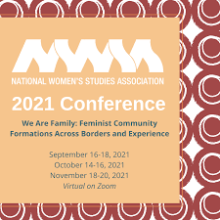National Women's Studies Association Annual Conference 2021
We are Family: Feminist Community Formations Across Borders and Experience
Sept. 17-18 & Oct. 14-16, 2021 | Virtual | Online Program
Where do we stand? Speaking Global South in U.S. academia
This roundtable invites conversation on how to move away from statist transnational feminist frameworks that fail to expose the nation state itself as a violent and neo-colonial formation. Our focus is on finding ways to break out of Euro-Americentric feminist scholarship that renders invisible women’s radical insurgency emerging out of Global South. We will be talking about the conflation of transnational feminism with women of color feminism in US academia and how the European humanitarian frameworks of migration perpetuate the colonial geographical hierarchies that construct the West as the safe haven for those fleeing the chaos in the uncivilized Global South.
Moderator: Cricket Keating, UW GWSS Associate Professor
Presenters: Mediha Sorma, UW GWSS graduate student; Akanksha Misra, Suny Plattsburgh graduate student; Jainey Kim, UW GWSS graduate student; Christina Chung, UW GWSS graduate student
With A Little Help From My Friends: Queer(ing) Friendship, the Praxis of Community Care
Moderator: Shirley Yee, UW GWSS Department Chair
Presenters:
Michelle Morado, UW GWSS graduate student
"Pachucas: Embodiments of Resistance and Recognition": As a generation of young Mexican American women coming of age during World War II, pachucas provide insight into structures of race, class, gender and sexuality, shaping family life and social expectations. Situating pachucas as part of a genealogy of radical, liberatory friendship, their continued salience locates pachucas not only as historical agents but also as a cultural icon. Pachucas cultivated a landscape in which to consider the politics of care and community formation, signaled through language, leisure and visual cues. Drawing from this legacy, pachucas offer an emblem of friendship, nurturing recognition and care, across generations.
Jainey Kim, UW GWSS graduate student
"When We Collide": Using the concepts of authenticity and friendship as an episteme, in this paper I trace the often messy, difficult process of building feminist friendships as one that can illuminate modern liberalism’s instrumentalization of the Asian American identity as a tool for upholding logics of individualism that, through a divide-and-rule politic, limit collaboration across difference. I argue that friendship as an analytic can help us rupture such pre-existing social boundaries to develop new modes of collaborative resistance that can also reshape the potential to bridge transnational feminist alliances.
Keila Taylor, UW GWSS graduate student
"A Queer Feminist Food Politic": Food and foodways are deeply intertwined with family and kin-making, especially for queer, trans, and communities of color. In the U.S., western dining spaces such as bars and cafes have been sites of violence for these individuals yet they have also supported vital community resources such as social organizing and fellowship. In this paper I situate food as a medium that weaves together unspoken knowledges and heritage to articulate new conceptions of kinship. Through a queer feminist framework, food transcends its material purpose and offers new insights into how individuals create intimacy and build friendships with those around them.
Re-Thinking Transnational Feminism: Kurdish Women’s Resistance Across Nation-States
Presenter: Mediha Sorma, UW GWSS graduate student
"Re-Thinking Transnational Feminism: Kurdish Women’s Resistance Across Nation-States": This paper studies Kurdish women’s reproductive and mothering practices as members of Kurdish resistance in contemporary Turkey, where war and state violence figure as a normative social condition rather than a state of exception. My research looks at survival practices, spaces of care, unconventional kinship systems and sites of anti-nationalist resistance created by diasporic Kurdish women in Turkish cities. The project thinks through gendering processes in conditions of constant duress and war from the perspective of Kurdish mothers who mother under genocidal attempts of the Turkish settler state and whose response to state racism is not only affective but militant.
